This article was co-authored by Chloe Carmichael, PhD and by wikiHow staff writer, Nihal Shetty. Chloe Carmichael, PhD is a Licensed Clinical Psychologist who runs a private practice in New York City. With over a decade of psychological consulting experience, Dr. Chloe specializes in relationship issues, stress management, self esteem, and career coaching. She has also instructed undergraduate courses at Long Island University and has served as adjunct faculty at the City University of New York. Dr. Chloe completed her PhD in Clinical Psychology at Long Island University in Brooklyn, New York and her clinical training at Lenox Hill Hospital and Kings County Hospital. She is accredited by the American Psychological Association and is the author of “Nervous Energy: Harness the Power of Your Anxiety” and “Dr. Chloe's 10 Commandments of Dating.”
There are 13 references cited in this article, which can be found at the bottom of the page.
This article has been viewed 33,567 times.
It’s likely that at some point in your life, you’ll know someone who struggles with depression. If a friend or family member has disclosed their depression to you, you’re probably wondering how you can help support them. Depression is a serious illness, and responding in a constructive way after someone talks to you about their mental health is important. We’re here to help by walking you through how to respond when someone tells you they have depression.
Steps
Expert Q&A
-
QuestionWhat activities are good for people with depression?
 Chloe Carmichael, PhDChloe Carmichael, PhD is a Licensed Clinical Psychologist who runs a private practice in New York City. With over a decade of psychological consulting experience, Dr. Chloe specializes in relationship issues, stress management, self esteem, and career coaching. She has also instructed undergraduate courses at Long Island University and has served as adjunct faculty at the City University of New York. Dr. Chloe completed her PhD in Clinical Psychology at Long Island University in Brooklyn, New York and her clinical training at Lenox Hill Hospital and Kings County Hospital. She is accredited by the American Psychological Association and is the author of “Nervous Energy: Harness the Power of Your Anxiety” and “Dr. Chloe's 10 Commandments of Dating.”
Chloe Carmichael, PhDChloe Carmichael, PhD is a Licensed Clinical Psychologist who runs a private practice in New York City. With over a decade of psychological consulting experience, Dr. Chloe specializes in relationship issues, stress management, self esteem, and career coaching. She has also instructed undergraduate courses at Long Island University and has served as adjunct faculty at the City University of New York. Dr. Chloe completed her PhD in Clinical Psychology at Long Island University in Brooklyn, New York and her clinical training at Lenox Hill Hospital and Kings County Hospital. She is accredited by the American Psychological Association and is the author of “Nervous Energy: Harness the Power of Your Anxiety” and “Dr. Chloe's 10 Commandments of Dating.”
Licensed Clinical Psychologist One thing that I would recommend for a person who is depressed is to volunteer to help other people. When we start helping other people, we start noticing that other people, might even have bigger problems than we do, but that they seem to be managing. Another reason why volunteering is really helpful for people with depression is that another hallmark feature of depression oftentimes is a sense of worthlessness. By volunteering and helping others, you offer a lot of worth and a lot of value. You would be helping them and you would also be helping yourself because you would be affirming a sense of your worthiness and also getting perspective instead of just getting absorbed in your problem. You would start to focus on other people, which can be very helpful if you're in a depressed state.
One thing that I would recommend for a person who is depressed is to volunteer to help other people. When we start helping other people, we start noticing that other people, might even have bigger problems than we do, but that they seem to be managing. Another reason why volunteering is really helpful for people with depression is that another hallmark feature of depression oftentimes is a sense of worthlessness. By volunteering and helping others, you offer a lot of worth and a lot of value. You would be helping them and you would also be helping yourself because you would be affirming a sense of your worthiness and also getting perspective instead of just getting absorbed in your problem. You would start to focus on other people, which can be very helpful if you're in a depressed state.
References
- ↑ https://health.gov/myhealthfinder/topics/everyday-healthy-living/mental-health-and-relationships/depression-conversation-starters
- ↑ https://www.helpguide.org/articles/depression/helping-someone-with-depression.htm
- ↑ https://rightasrain.uwmedicine.org/life/relationships/how-to-support-friend-with-depression
- ↑ https://www.heretohelp.bc.ca/q-and-a/someone-i-love-has-been-diagnosed-with-depression
- ↑ https://health.gov/myhealthfinder/topics/everyday-healthy-living/mental-health-and-relationships/depression-conversation-starters
- ↑ https://health.gov/myhealthfinder/topics/everyday-healthy-living/mental-health-and-relationships/depression-conversation-starters
- ↑ https://www.mentalhealth.org.uk/stories/andrew-loving-someone-depression
- ↑ https://www.nimh.nih.gov/health/publications/depression-in-women
- ↑ https://www.nimh.nih.gov/health/publications/depression-in-women
- ↑ https://www.mentalhealth.org.uk/stories/andrew-loving-someone-depression
- ↑ https://depression.org.nz/help-someone/
- ↑ https://depression.org.nz/help-someone/
- ↑ https://depression.org.nz/help-someone/
- ↑ Chloe Carmichael, PhD. Licensed Clinical Psychologist. Expert Interview. 19 July 2019.
- ↑ https://www.mentalhealth.gov/talk/friends-family-members
- ↑ https://www.mind.org.uk/information-support/types-of-mental-health-problems/depression/for-friends-and-family/
- ↑ https://www.mayoclinic.org/diseases-conditions/depression/in-depth/depression/art-20045943
- ↑ https://www.mayoclinic.org/diseases-conditions/depression/in-depth/depression/art-20045943
- ↑ https://www.mayoclinic.org/diseases-conditions/depression/in-depth/depression/art-20045943
- ↑ https://www.nami.org/About-Mental-Illness/Mental-Health-Conditions/Depression
- ↑ https://www.nami.org/About-Mental-Illness/Mental-Health-Conditions/Depression
- ↑ https://www.mentalhealth.org.uk/stories/andrew-loving-someone-depression
- ↑ https://www.mentalhealth.org.uk/stories/andrew-loving-someone-depression
- ↑ https://www.beyondblue.org.au/the-facts/supporting-someone/looking-after-yourself


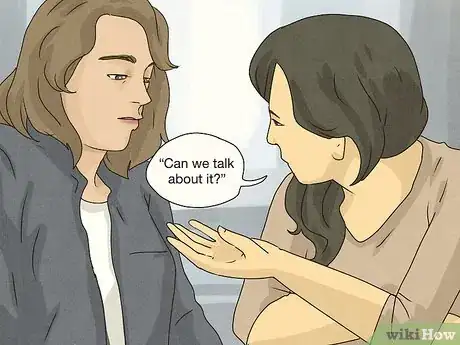

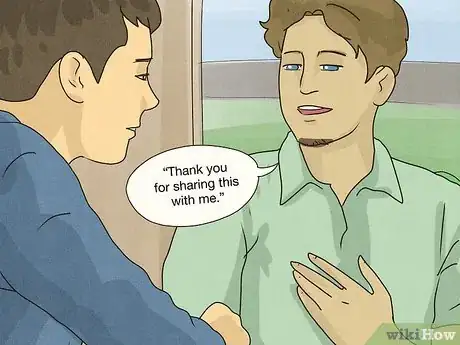




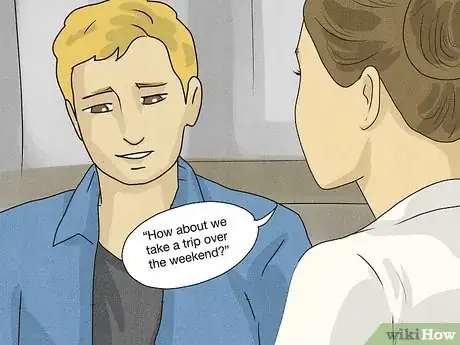


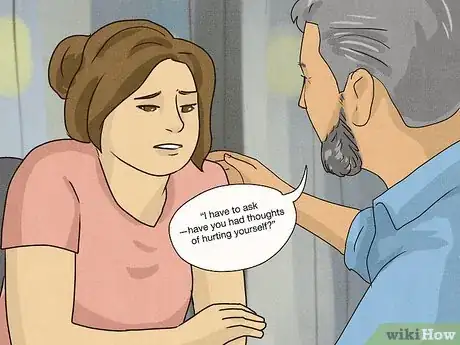
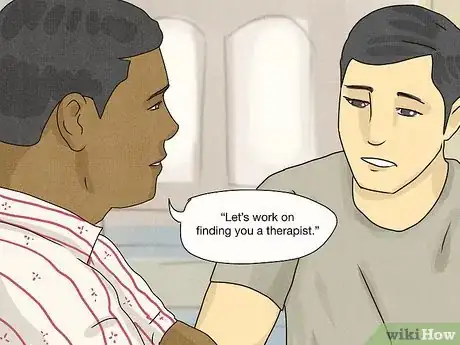

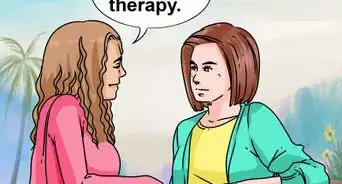
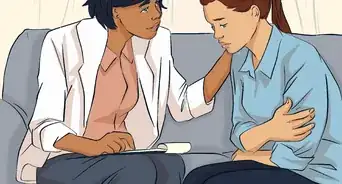
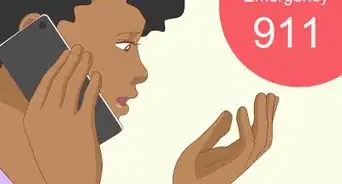
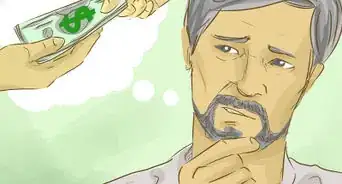



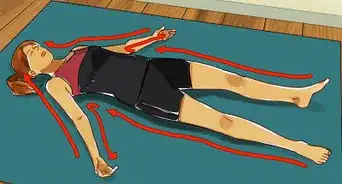


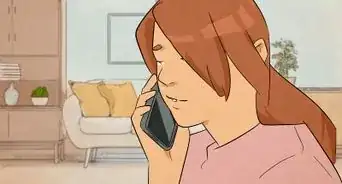















































Medical Disclaimer
The content of this article is not intended to be a substitute for professional medical advice, examination, diagnosis, or treatment. You should always contact your doctor or other qualified healthcare professional before starting, changing, or stopping any kind of health treatment.
Read More...